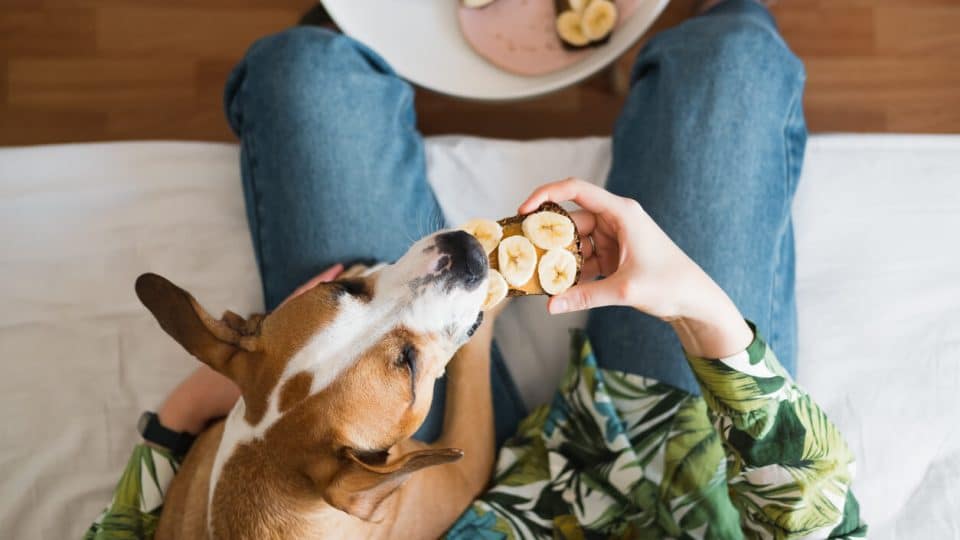- This article has been reviewed by a pet health professional. It is not a substitute for professional veterinary advice.
If you notice your dog is licking their lips and half of your breakfast banana has magically disappeared while you went to get coffee, then you don’t need to worry—about their health, at least. Yes, dogs can eat bananas.
While a great option for a low-calorie, nutritious treat, it’s best to feed them in moderation due to their high sugar content. Most dogs can eat up to a few slices of banana a day (or up to half of a banana for a larger dog), and many homemade dog treats contain bananas as a common ingredient to jazz up the recipe.
You may, however, need to brush up on your training routine so they don’t steal your food. Too many bananas means a lot of sugar, which could ruin their appetite or lead to weight gain.
Read on to learn more about safely giving your dog bananas as a snack.
Benefits of Bananas For Dogs
Bananas are packed with nutrients such as potassium, magnesium, Vitamin B6, and Vitamin C. These vitamins play an essential role in your dog’s overall health and energy levels. However, if you are already feeding your dog a commercially available dog food, adding a banana won’t likely be a game changer to their diet.
But if your dog likes bananas, treating them could strengthen your bond with your dog. As a training treat, small dogs can have a couple of slices of banana, while larger dogs can have up to half a banana.
Keep your dog’s banana portions small
The high fibre content of bananas can help with dog diarrhoea, but the high sugar content of bananas can also lead to an upset stomach. If you notice your dog’s stool becomes loose after they eat bananas, then it’s best to switch this treat out.
Introducing a lot of sugar into your dog’s diet can cause a shift in their natural gut bacteria which can cause diarrhoea and digestion problems. In addition, excessive feeding of bananas may cause health-related issues such as obesity and diabetes over time.
Avoid Feeding Peels
Though banana peels aren’t toxic, they can be difficult for dogs to digest. The tough, fibre-rich consistency of the peel can cause a blockage in your dog’s digestive system. It’s recommended to keep banana peels out of your dog’s reach and peel the banana before you share it with them.
If your dog does ingest a banana peel, keep an eye on them to ensure they’re still eating and pooping as usual. If you notice they aren’t following their usual potty routine or are behaving differently (lethargic or constantly pacing), then it’s best to take them to the vet to make sure there isn’t a blockage in their digestive system.
Avoid pre-made banana goods
Avoid giving your dog any baked banana goods that you don’t know the ingredient list for. This includes banana breads, pancakes, and muffins, which usually include chocolate or raisins. Chocolate and raisins are toxic to dogs. Store-bought banana goods may also have excess sugar your dog doesn’t need.
Can Dogs Be Allergic to Bananas?
While an allergy isn’t necessarily common, it is a good idea to keep an eye on your dog after feeding them something new, like bananas.
Evidence of your dog having an allergenic reaction will include symptoms like:
- Scratching and butt-scooting
- Hair loss, either an all-over thinning or bald spots
- Tummy trouble like vomiting and diarrhoea (for food allergies)
- Swelling of the feet, face, or joints
- Swollen muzzle and/or eyes
- Sudden gasping and trouble breathing
- Rapid-onset diarrhoea or vomiting
The last three are signs of anaphylaxis and require emergency care.
If you have any concerns about your dog’s reaction to food, it’s always best to consult with your veterinarian. Dogs can have common food allergies, including chicken and beef. Knowing your dog’s allergies or reading through the ingredient list can help narrow down if a new treat or food is causing allergic reactions.
Ways to Feed Your Dog Bananas as a Treat
There are many ways to prepare this sweet treat for your dog:
- Mash up a little banana and add or mix it to your dog’s usual food bowl.
- Mix banana with a little yoghurt or peanut butter onto a lick mat.
- Create some peanut butter banana ice cream for the summer.
- Stuff a bit of banana in a Kong and freeze it for a treat that’ll keep your dog busy.
- Slice a banana and share a few bites with your dog, then freeze the rest for a frozen banana bite recipe.
- Combine coconut, oat flour, and banana for these gluten-free banana dog treats.
You may notice your dog’s gut will appreciate more natural dog treats with bananas as an ingredient.
Mix It Up! Other Fruits to Try
Bananas are a delicious and nutritious treat for your dog to enjoy in moderation. There are also other fruits that are safe for your dog to explore, including:
- Apples
- Blueberries
- Cranberries
- Strawberries
- Mango
- Raspberries
Allowing your dog to try new foods is a great way to increase your dog’s overall well-being and happiness. Hiding these foods in toys may also make them more exciting. Eating food can be a mentally stimulating activity for dogs, as long as they are placed in the right puzzle toys (not too difficult or easy). In fact, these enrichment activities have been proven to reduce destructive behaviour like chewing. Just be sure to know which foods your dog can and can’t eat.



